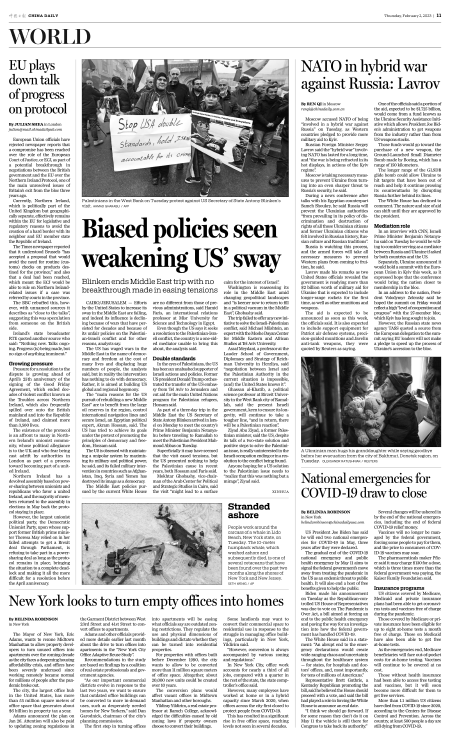
Palestinians in the West Bank on Tuesday protest against US Secretary of State Antony Blinken's visit.
CAIRO/JERUSALEM — Efforts by the United States to increase its sway in the Middle East are failing, and indeed its influence is declining because of wars that have persisted for decades and because of its unfair policies on the Palestinian-Israeli conflict and for other reasons, analysts say.
The US has waged wars in the Middle East in the name of democracy and freedom at the cost of many lives and displacing huge numbers of people, the analysts said, but in reality the intervention has nothing to do with democracy. Rather, it is aimed at building US global and regional hegemony.
The "main reasons for the US pursuit of rebuilding a new Middle East" are to benefit from the large oil reserves in the region, control international navigation lines and secure Israel, an Egyptian political expert, Akram Hossam, said. The US has tried to achieve its goals under the pretext of promoting the principles of democracy and freedom, Hossam said.
The US is obsessed with maintaining a unipolar system by maximizing its military and political power, he said, and its failed military intervention in countries such as Afghanistan, Iraq, Syria and Yemen has destroyed its image as a democracy.
The Middle East policies pursued by the current White House are no different from those of previous administrations, said Hamid Faris, an international relations professor at Misr University for Science and Technology in Egypt.
Even though the US says it seeks a resolution to the Palestinian-Israeli conflict, the country is a one-sided mediator unable to bring this about, the analysts said.
Double standards
In the eyes of Palestinians, the US has been an unabashed supporter of Israeli actions and policies. Former US president Donald Trump orchestrated the transfer of the US embassy from Tel Aviv to Jerusalem and cut aid for the main United Nations program for Palestinian refugees, Hossam said.
As part of a three-day trip in the Middle East the US Secretary of State Antony Blinken arrived in Israel on Monday to meet the country's Prime Minister Benjamin Netanyahu before traveling to Ramallah to meet the Palestinian President Mahmoud Abbas on Tuesday.
Superficially it may have seemed that the visit eased tensions, but the US presented nothing to help the Palestinian cause in recent years, both Hossam and Faris said.
Mokhtar Ghobashy, vice-chairman of the Arab Center for Political and Strategic Studies in Cairo, said the visit "might lead to a surface calm for the interest of Israel".
Washington is reassessing its role in the Middle East amid changing geopolitical landscapes and "is keener now to return to fill in a political vacuum in the Middle East", Ghobashy said.
The trip failed to offer any new initiative to solve the Israeli-Palestinian conflict, said Michael Milshtein, an expert with the Moshe Dayan Center for Middle Eastern and African Studies at Tel Aviv University.
Assaf Meydani, a professor at the Lauder School of Government, Diplomacy and Strategy of Reichman University in Herzliya, said "negotiation between Israel and the Palestinian Authority in the current situation is impossible, (and) the United States knows it".
Ghassan al-Khatib, a political science professor at Birzeit University in the West Bank city of Ramallah, said the present Israeli government, keen to ensure its longevity, will continue to take a tougher line, "and in return, there will be a Palestinian reaction".
Ziyad Abu Ziyad, a former Palestinian minister, said the US, despite its talk of a two-state solution and positive steps to solve the Palestinian issue, is really uninterested in the Israeli occupation ending or in a resolution to the conflict being found.
Anyone hoping for a US solution to the Palestinian issue needs to "realize that this was nothing but a mirage", Ziyad said.

